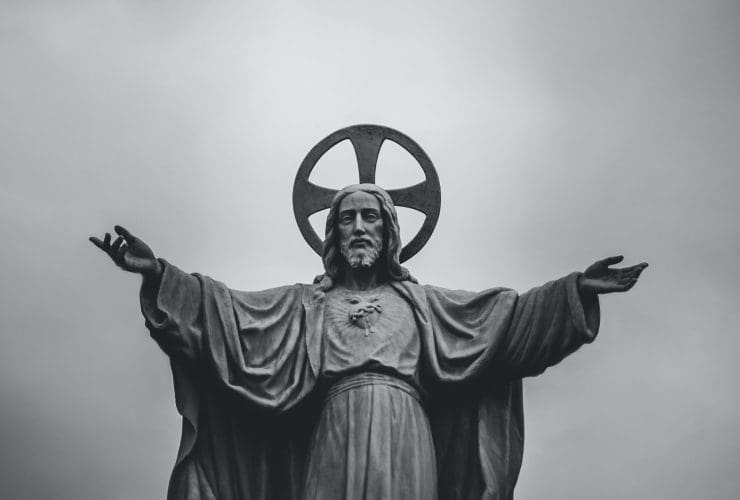Q:
“In the Bible Jesus says like Jonah in the belly of the whale, He will be down for “3 days and 3 nights”. But churches teach that Jesus died on the 2 Friday and the Bible says Jesus died in the afternoon and rose early morning on Sunday. This would mean He was gone for 3 days and two nights not “3 days and 3 nights”. Does this mean Jesus really died on a Thursday afternoon? Did Jesus die during or before the Passover? Is Passover one day or a whole week? Was “the last supper” a Passover meal? Please help me with these questions. Thank you! Thank you again! And thank you once more!”
Brian P.
Hey Brian! Good question, and I do not think it’s too difficult to resolve. When Jesus Christ said, “A wicked and adulterous generation asks for a sign! But none will be given it except the sign of the prophet Jonah. For as Jonah was three days and three nights in the belly of a huge fish, so the Son of Man will be three days and three nights in the heart of the earth.” (Matthew 12:39-40) he referenced Jonah 1:17 as a sign, “Now the Lord provided a huge fish to swallow Jonah, and Jonah was in the belly of the fish three days and three nights.”
First take notice that Jonah’s words here are not a prophesy about a future event nor was it explicitly pointing to Messiah. Jesus uses these words as a sign and memory aid to point to something else – something greater. And like all signs, they quickly express or get to the point of something important, they are not the important thing itself. He references this part of Jonah specifically as a prophetic allusion or archetype of His spiritual mission: His death and resurrection leading to the consequent repentance of foreigners. Jesus’ mission was not to duplicate or replay the story of Jonah. So, whether Jesus was dead for a full 3 days and 3 nights is not necessarily relevant to Christ’s overall prophetic point or mission. Furthermore, Christ was not fulfilling Jonah’s prophecy because there was nothing to fulfill; Jonah’s prophecy is not a predictive prophecy about Messiah, it’s just an allusion; there are no strings attached or standards Christ had to meet. But that does not mean the three-day, three-night motif is spiritually weightless.
Christ was dead over the course of three days and rose on the “third day”, which carries tremendous prophetic significance with other Scriptures. For example, on the third day: God tested Abraham and Isaac (Genesis 22:1-19), Joseph offered a way to save his brothers, the tribes of Israel, from looming death (Genesis 42:18-20), God made a covenant with Israel on Mount Sinai (Exodus 19:9-16), Hosea’s prophecy of restoration (Hosea 6:1-2), to name a few, all of which are signs about resurrection and spiritual restoration like Jonah.
How Luke 11:29-32 records this conversation is also very telling. Luke does not go into detail about the days, instead he goes straight to the heart of Christ’s words: “The men of Nineveh will stand up at the judgment with this generation and condemn it, for they repented at the preaching of Jonah; and now something greater than Jonah is here.” (v.32) Jonah in the belly of the fish and Christ conquering death is about repentance, restoration and resurrection. These are some of the most common prophetic earmarks throughout the OT. From Genesis and Exodus to Hosea and Micah – not just Jonah – the OT points to Jesus Christ, and He was pointing back to it, too.
A Full Day in Ancient Judaism
Also, in Jewish tradition a full day included nightfall; at the moment the sun set, the next day immediately began. This is especially true of holy festivals. Two of the most important feasts, Passover and Day of Atonement, began at sunset (Exodus 12:18; Leviticus 23:5, 32).
Second, the Jewish idiom “day and night” refers to a full or mostly full day; from sunset to sunset, give or take. It would not be restricted to a 24-hour period. To say, “a day and a night” would simply mean a “day”, but it did not necessitate it to be a full day only, it could be “in a day” too. While Jesus did not, technically, die for three full 24-hour days, his death spanned over the course of three days; so, by extension, if Jesus rose on the “third day”, then it would include all three previous nights as part of the full day (Friday, Saturday, and Sunday). After all, Jesus did not slowly resurrect for 24-hours on the third day, he resurrected in a moment on a single day – the same logic applies to “three days and three nights”. This was sufficient for Jews at the time and there is no reason from our 21st Century vantage point to think otherwise. To say it a different way, it is not a scientific claim. It does not mean it took place down to the exact millisecond or particle. No one was even thinking about the technical exactitude of the earth’s rotation around the sun, or any of the physical sciences for that matter, like we do today.
But if you find this insufficient still and think sunlight is needed to distinguish day from night, then consider at Christ’s crucifixion, “It was now about the sixth hour [12:00 PM], and there was darkness over the whole land until the ninth hour [3:00 PM], while the sun’s light failed.” (Luke 23:44-46; Matthew 27:45; Mark 15:33). In other words, there was no light at all when Christ died, which might spiritually suggest (in a less scientifically tight community) that “night” was over the earth, like in Jonah 1:15 when the storm and thus darkness covered the sea until they though Jonah into it to propitiate God’s wrath.
Just remember, the primary point of the Bible is to first provoke spiritual change within people: conviction, confession, repentance, restoration, resurrection.
Does this mean Jesus really died on a Thursday afternoon? Did Jesus die during or before the Passover?
No. Scripture indicates Jesus died during Passover. He died on Friday, rested on Sabbath (Saturday), and rose on Sunday (Matthew 28:1).
Is Passover one day or a whole week?
An unblemished lamb was kept in the house of all Jews for one week and then was killed and eaten in one day, Friday night before Saturday (at nightfall on Sabbath), which was the Passover meal (Exodus 12:8). The Passover meal was celebrated to remember the Exodus when the spirit of death did not enter the homes with the Passover lamb’s blood smeared on the gate and/or doorposts (Exodus 12:7). The Christian symbol here is that death itself passed over those who believe in Jesus Christ, the Passover lamb.
Was “the last supper” a Passover meal?
Funny enough, this is one of the most debated topics in Christian history. I haven’t quite immersed myself in it yet, but I’ll give you my two cents worth. I think the trouble comes when theologians look at the New Covenant as a political replacement rather than a continuation of God’s plan.
The last supper initiated the new covenant, a new remembrance ceremony through communion. Communion is bread and wine, which is, more or less, the Passover meal without a lamb. The slain lamb, in Christian context, is symbolically Jesus Christ (Revelation 5:12, 13:8). Like a lamb that was sacrificed and prepared before the Passover meal (Exodus 12:6), Christ was crucified just before the Passover meal as well (3:00 PM). Jesus’ death was the fulfillment of the lamb sacrifice, which was a sign that God would save his people from death.
If the last supper didn’t have anything to do with Passover, why didn’t Jesus initiate communion after his resurrection on Sunday? After all, He could eat broiled fish (Luke 24:42). So why not wait? Well, I think there’s good reason.
Jesus actualized the Passover tradition and symbolism in the New Covenant. God was moving the Scriptural narrative forward with Passover setting the stage. This would invoke remembrance in Jesus’ disciples who would later connect the spiritual significance of the festival with Christ’s overall mission; all of which would be less evident if communion happened on Sunday after Passover. Christ would go on to accomplish the purpose of the Exodus Passover through His atoning sacrifice, making communion front and center with the Passover symbol as the backdrop. In simpler words, Communion does not replace Passover, it includes it. The lamb itself was merely a sign or “shadow of the good things to come” (Hebrews 10:1, 8:5; Colossians 2:16-17). So, instead of a lamb invoking remembrance, Jesus replaces it as the central sacrifice who was raised from the dead. If the lamb who was slain is resurrected, the need for a slaughtered lamb to be on your dinner plate becomes unwarranted if not redundant. In my view so far, Passover handed the baton over to Communion, if you will. It is a transition from one point in the narrative to the next, a narrative we are all a part of. This is the hope that we have in Jesus Christ. The Old is the shadow casted by Christ in the New.
I hope that squelches any troubles you might have. God bless you, Brian!

Matlock Bobechko is the Chief Operating/Creative Officer of Bible Discovery. He is an eclectic Christian thinker and writer, award-winning screenwriter and short filmmaker. He writes a weekly blog on theology, apologetics, and philosophy called Meet Me at the Oak. He is also an Elder at his local church.






